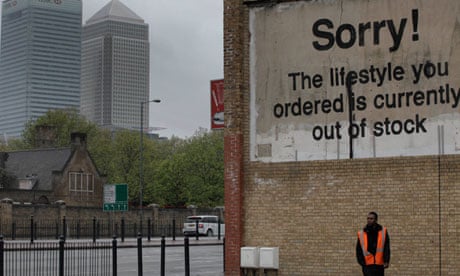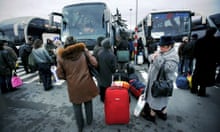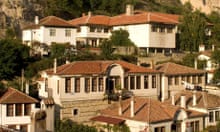Ministerial consideration of launching a negative advertising campaign to deter Bulgarians and Romanians from coming to work in Britain next year is "bordering on the farcical", Keith Vaz, the chairman of the Commons home affairs select committee, has said.
Vaz warned that such propaganda tactics had been used in the past and been found to be counterproductive.
The campaign, which would focus on the downsides of British life perhaps by suggesting jobs are scarce and it rains all the time, is one of a range of potential measures to stem immigration to Britain next year when curbs imposed on both country's citizens living and working in the UK will expire.
"I have asked the home secretary several times to give us an estimate as to how many Romanians and Bulgarians will enter the country in 2014 but she has not done so. Successive governments have failed to provide accurate estimates," said Vaz.
"On the one hand the Home Office doesn't want them in but on the other hand, the minister for Europe is saying there is freedom of movement. The government is actually in danger of encouraging more people to come … Ministers would be better off working with Romanian and Bulgarian counterparts and the EU to address the reasons migrants want to come here in the first place," he said.
The home secretary, Theresa May, has so far resisted making any estimate of how many Romanians and Bulgarians will come when the seven-year "transitional curbs" on them being able to work in the rest of the EU are lifted at the end of this year. However the Foreign Office has commissioned its own estimate from the National Institute of Economic and Social Research (NIESR).
Ministers have also set up a special cabinet committee which is looking at ways in which migrants from other EU countries working in Britain may have their access to public services restricted, including claiming welfare benefits when they become unemployed. But no firm conclusions have yet been reached as to how this can be done.
The prime minister's official spokesman declined to comment on the advertising campaign but confirmed the government was considering its options. He said: "The issue here is around dealing with potential damage to the UK labour market and potential scope for curbing immigration to that end. We are in the process of considering what we may be able to do. Clearly, there is a European legal framework within which we have to operate."
He said the experience of Polish migration showed how difficult it could be to provide a credible and robust numerical estimate. The Downing Street spokesman however confirmed that the NIESR had been commissioned to look at the potential impacts of Romanian and Bulgarian immigration to the UK.
A report over the weekend quoted one minister saying that a negative advertising campaign would "correct the impression that the streets here are paved with gold".
There was no word on how any advertisement might look or whether it would use the strategy of making Britain look as unattractive as possible or emphasise to would-be migrants the positive aspects of their own countries such as Romania's Carpathian mountains or Bulgaria's Black Sea resorts. With governments around the world spending millions on hiring London-based consultants to undertake "reputation laundering" there would be a peculiar irony if Britain chose to trash its own image perhaps by highlighting winter flooding of homes or the chaos of a Saturday night A&E ward.
There are precedents. In 2007, Eurostar ran advertisements in Belgium for its trains to London depicting a tattooed skinhead urinating into a china teacup. It remains unknown if any discussions have taken place over personalities who could carry off a similar exercise in anti-nation branding.
On Sunday a Downing Street source said: "It is true that options are being looked at but we are not commenting on the specific things mentioned … as obviously it is an ongoing process and we will bring forward any proposals in due course."
The source also said that the government did not think the rule changes would necessarily bring a big influx of people, since Romanians have closer links to Germany and Italy rather than Britain.
Other reported options include making it tougher for EU migrants to access public services. Another is to deport those who move to Britain but do not find work within three months.
The Home Office has not produced an official estimate of how many of the 29 million Romanian and Bulgarian citizens will take advantage of their new freedoms when controls are lifted.
Campaign groups such as MigrationWatch have predicted that 250,000 will come from both countries over the next five years, although these figures are disputed. One Tory MP, Philip Hollobone, has claimed that Romanian and Bulgarian communities will treble to 425,000 within two years.
These figures have been questioned by experts, because they are based upon the numbers of Poles and Czechs who moved to Britain in 2004. Then, only three countries opened their borders. This time, all of the 25 EU states will lift labour market restrictions.
Buoyed by Cameron's offer of an in-out referendum, a growing number of Tory MPs now believe the UK should block the lifting of restrictions even if it were to prompt a row with the European commission.
The idea, however tentative, appears to clash with the billions of pounds Britain spent on the Olympics, partly to drive up the country's reputation. It also emerged as the Home Office launched a guide to Britishness for foreigners who would be citizens which opens with the words: "Britain is a fantastic place to live: a modern thriving society."










Comments (…)
Sign in or create your Guardian account to join the discussion